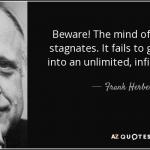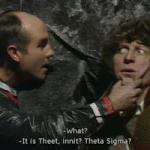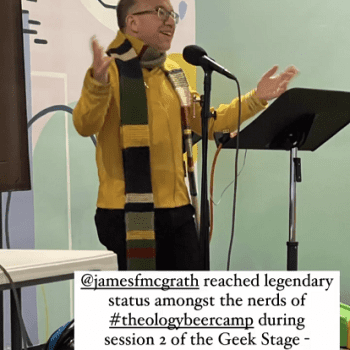Now of course all of that could simply be about me and my subjective experience, or my faith community’s common subjective experiences. For the past 200 years some very devout and admirable people have been content to say that this is all their God-talk entails—it’s about how we feel, not about what’s real. But I’m not satisfied with that. For me, to say that all this simply subjective experience would seem to deny that the meaning and presence I seem to sense are uncontainable. Their seeming uncontainability is what draws me to these experiences so deeply. To call them simply subjective would make them easily containable, and I wouldn’t take them as seriously any more.
Click through to the Grace Unlimited blog to read his whole reflection on faith in God. I think Charles has not only made a cogent case for his own stance, but also come up with an insight into what is wrong with Anselm’s famous ontological argument for God’s existence.
What do I mean? I think that Anselm’s argument faltered by blurring two things that Charles keeps distinct: what it makes sense to believe if one is trying to be consistent, and what one can demonstrate definitively about objective reality outside oneself. And the argument, reworked in this form, also works better by focusing on not only consistency of beliefs but also the experience of a sense of transcendence and perhaps even a glimpse of the infinite. Experiencing a sense of the infinite does not prove that reality is infinite. But it doesn’t make sense to believe that one has had an experience of connecting with transcendent reality and describe it in those terms, and to simultaneously say it is all in one’s head.
As an aside from this, the question of the persuasive power of religious experience even for ourselves is one that interests me in its own right. And so I was struck that, in a recent interview, Nicholas Wolterstorff offered Paul as the historical person he’d most like to meet, saying,
I would dearly love to have a conversation with St. Paul. I would, of course, ask him to interpret a number of difficult passages in his letters. But more than that, I would like to ask him about his experience. Did he ever wonder whether it was all a delusion, or was his experience on the road to Damascus so compelling that the thought of its being a delusion never crossed his mind?
And how did what he says in his letters come to him—things that you and I count as revelation? What was that like? Did it come in a flash? Was it the result of hard thought? I would also like to ask him whether these questions seem to him really strange—as coming from another planet.
Returning to our original point, there are plenty of other areas in which a similar point applies, in the sense that claiming to believe certain things without following through with their corollaries is at least self-contradictory, and probably deeply hypocritical. Several bloggers compared believing in Jesus without following his teachings to belief in veganism without practicing veganism. Samantha Field wrote:
I can’t find the quote now, but a long time ago I read an analogy that I liked. Veganism isn’t about believing that people should follow a plant-based diet. Being vegan means actually eating a plant-based diet. If you say you believe we should only eat plants, but eat bacon every other day, you’re not actually a vegan and insisting that you are because of your “beliefs” is ridiculous. They went on to apply this example to Christianity: you can have any sort of “beliefs” about Jesus and God and the Bible, but if you fail to act like a Christian, then calling yourself a Christian because of your supposed intellectual positions is equally ridiculous.
See also the following two blog posts, one about whether one can study veganism or religion without practicing it, the other about veganism as a social justice concern to defend the voiceless:
http://www.religiousstudiesproject.com/2016/09/24/theoretical-veganism-practicing-religious-studies-without-religion/
Spotlighting Student Work #16: Silence, Speech, Prophecy, and Veganism
Finally, the article in the Chronicle of Higher Education about the fact that students learn by doing is also relevant, I think.

















